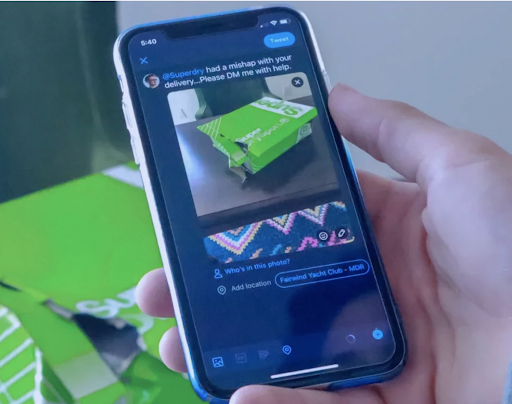Business messaging is the way connected consumers prefer to engage with you. They are mobile and busy and need to reach you on their terms. If they need to ask about the status of their order, they’re going to want to text you. If they need help navigating your website, they are going to use live chat.
As the number of channels that customers want and expect to engage with your company grows, the possibilities for companies to impact customer experience in a positive (and negative) way increases exponentially. In this post, we provide 5, plus one bonus, must-do business messaging use cases that companies need to leverage today to up their customer experience game.
Business Messaging Works Smarter
First, let’s consider why business messaging has become the preferred way for companies and consumers to engage with one another. Sure, the fact that everyone has a mobile device helps and that they use messaging apps to communicate with friends and family more frequently than any other function on their phone doesn’t hurt either. But, it’s not just the pervasiveness and convenience of messaging.
Business messaging also allows for more efficient and streamlined conversations. There are valuable business messaging features that make it easier to engage with digital-first consumers. These features bring the best of older engagement methods, like the immediacy of phone calls, to messaging conversations, while casting off the parts that just don’t work anymore, like long wait times.
Take, for example, the ability for agents to get help. Call centers use call monitoring to listen in on agents and even join calls in some instances. This functionality allows managers to observe calls and intervene if the agent needs help.
Business Messaging offers the same ability for managers to silently monitor messaging conversations and intervene if necessary. With messaging, these features get the added upgrade in the collaboration department. Instead of the agent having to put the caller on hold to ask for assistance, agents can ask for the help of peers or a manager without the customer even knowing. This is just one example of the many business messaging use cases that make digital customer engagement a better experience.
Business Messaging Use Cases
1. Convert shoppers into buyers
Quiq Messaging helps convert tentative shoppers into customers. Clients like Tailored Brands, owners of Men’s Wearhouse and Jos A. Banks, uses Quiq to help customers to choose the right suit, place an order, answer promotion questions, or set in-store appointments. If a consumer wants to make a purchase but has a question, it needs to be easy to get an answer right away.
Back in the day, many companies implemented web chat for just this reason. However, the majority of website visitors today are on mobile devices and web chat simply isn’t the best option for a mobile phone.
Why not make it as easy and comfortable to contact your company as it is to text with friends? Quiq clients have seen a higher conversion rate from text messaging than any other channel (over 5 ppts higher than web chat and 8-14 ppts higher than email and phone calls).
2. Shift phone calls to text
Quiq Messaging can help significantly reduce your contact center costs by converting phone calls into messaging conversations. In fact, Brinks Home Security reduced phone calls by 10% just by adding messaging. By converting a phone call to a text, the conversation is moved from the most expensive channel to the least expensive channel and the customer will actually be happier. Hey, let’s face it, they didn’t want to make a phone call in the first place, but they needed help right away.
Just add the option to text to your phone system (IVR). If they call in, your customer will hear something like this when they contact you:
“An agent will be with you shortly. If you’d rather text with an agent, press 1….”
When the customer presses 1, they immediately receive a text message to start a conversation directly with an agent, resulting in a cost savings of 80%! Customers will be more satisfied because they prefer to text and you’ll be more efficient. Win-win!!
3. Provide post-sales service
Even though most consumers have their phone in their hand or within reach 24/7, business messaging goes beyond SMS/text messaging. Factors such as your target market demographics and the nature of your business can influence the channel your customers prefer to reach you. Younger consumers may look for you on Twitter, while Gen X buyers expect to see you on Facebook.
With Quiq, you can meet your customers wherever they are to provide service and support however and whenever they need it. Quiq can open one or all of these channels to your customers, based on your business requirements. No matter what channel the message originates from, your employees can manage, access, search, and report on conversations through one, unified, intuitive platform.
4. Increase response rates
Business messaging is the way to get a consumer’s attention and response. If you seek to increase response rates to promotions or notifications, then sending an outbound message is the way to go. Considering most text messages have a 98% open rate and are read within 3 minutes of receipt, it’s easy to assume that your message won’t be lost in a sea of subject lines or mistakenly filtered as spam. Plus, recipients can be easily segmented so that only targeted, relevant, and timely promotions are sent.
Even industries like financial services have realized an increase in response rates. Credit Unions, like Southern Chautauqua Federal Credit Union, have seen an increase in collection recovery because they’ve made it easier for members to respond to loan collection notifications with inbound text replies.
5. Gain efficiency
Business messaging, by nature, increases efficiency because employees can handle multiple conversations at once, unlike a 1-to-1 phone call. Messaging has a higher concurrency, regardless of what channel the customer chooses to reach you over. This is due, in part, to shorter more concise messages that are sent over SMS or live chat for example. Efficiency can also be attributed to the asynchronous nature of messaging conversations that allows employees to address other customer conversations while waiting for responses.
Bots, also known as chatbots, can boost your agent productivity even further. A couple simple use cases for bots would be to greet customers, capture data to route the customer to the right agent or department, and close the conversation with a feedback survey. These are tasks that can usually be done prior to a human agent getting involved with a conversation.
6. BONUS TIP: Decrease inbound calls with notifications
Quiq Messaging makes notifications 2-way, allowing consumers to respond. Everyone is familiar with shipping and other notifications delivered via SMS. However, very few companies have the ability to allow customers to reply and to open up a conversation.
Quiq Messaging can send notifications and handle responses just like any other messaging conversation. Why is this important? Proactively informing customers of eliminates inbound phone calls by 10-15%.
Here are a few examples of reasons why 2-way outbound messages that are having huge impacts across a myriad of industries:
Retail Brand: “Your order has been delivered ”. Text us back if you have any questions. Thanks!!”
Customer: “Hi, I received the wrong color. Is this something you can help me with.”

Higher Education: “As an incoming freshman, you need a student ID card. Please click here to take a photo and have your card created.”
Student: “Thanks. I haven’t received any response on my financial aid application. Who should I contact?”
Credit Union: “Good morning. Your loan payment is past due. Please click here to make a payment.”
Member: “Oh thanks, I was out of town and forgot to mail the payment. Can I pay online?”
Now Is the Best Time for Business Messaging
These 6 business messaging use cases are just the basics. They are the “table stakes” to compete for today’s customers who demand ease and convenience when engaging with companies. There are many additional ways to use messaging that will propel your business ahead of the pack.
As the demand for business messaging grows, you’ll need a messaging solution that can scale with your business and has the flexibility to work with your current and future business needs. Now would be a great time to set up some time to talk with Quiq. Schedule a demo today.






